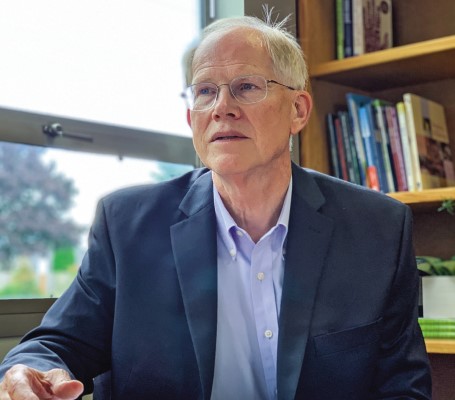A Conversation with John Kotter: Leading Transformative Change
January 01, 2021
Thought Leadership Series
The third installment in School Administrator’s Thought Leadership Series features John P. Kotter, one of the world’s preeminent scholars on organizational change and the author of multiple books, most recently That’s Not How We Do It Here! A Story about How Organizations Rise and Fall…and Can Rise Again.
Kotter, the emeritus Konosuke Matsushita professor of leadership at Harvard Business School, was interviewed for an hour by Larry Nyland, a retired superintendent who had tenures leading four Washington school districts over 24 years: Seattle, Marysville, Pasco and Shoreline.
The author of Leading Change, Our Iceberg Is Melting and Accelerate: Building Strategic Agility for a Faster-Moving World, among other works, Kotter was a General Session speaker at AASA’s 2007 National Conference on Education. The Leading Bold Change certification workshop that is based on his work was conducted for school leaders at AASA headquarters in 2011.

In Nyland’s interview, Kotter discusses the differences between leadership and management, the evolution of organizational management, and the importance of having a collaborative network rather than a hierarchy to be successful.
Acknowledging the challenges of leading in unsettling times, Kotter shares insights about how a “faster-moving, more complex, more unpredictable world” is bumping into not only organizations that weren’t designed to function well in such a world, but human nature that wasn’t designed for it either. He discusses his research on neuroscience and the brain’s survival response to threats.
Kotter suggests that although our world will never go “back to normal” — he calls that hope “fantasy” — we have opportunities to implement change that can produce positive outcomes for all of humanity.
This Content is Exclusive to Members
AASA Member? Login to Access the Full Resource
Not a Member? Join Now | Learn More About Membership
Other Books by John Kotter
Several other books by John Kotter have important applications for school system leaders. Here’s what I see as their relevancy.
- A Sense of Urgency (2008). At least 70 percent of change initiatives fail. In this work, Kotter shows how to build and keep momentum for change.
- Leading Change (2012). Kotter delivers an eight-step process for proactive change leadership. This book changed the way I think about change, and it’s become the leading blueprint for successful change worldwide.
- The Heart of Change: Real-Life Stories of How People Change Their Organizations (2012). Changing behavior is hard. It’s about thinking and feeling. This work, co-authored with Dan S. Cohen, shows how to win hearts and minds in making successful change.
- Accelerate: Building Strategic Agility for a Faster-Moving World (2014). The pace of change continues to “accelerate.” Five-year plans are not enough. Accelerate provides five core principles for creating continuous, and successful, innovation.
- Our Iceberg Is Melting: Changing and Succeeding Under Any Conditions (2016). Co-authored with Holger Rathgeber, this slim volume captures Kotter’s eight-step change process in story form. The easy-to-read metaphor makes it easier to talk about needed changes in an organization.
- That’s Not How We Do It Here! A Story about How Organizations Rise and Fall — and Can Rise Again (2016). A short story, co-written with Holger Rathgeber, illustrates the principles in Accelerate. The summary at the end introduces the idea of continuous innovation as a way to overcome the common roadblock: “That’s not how we do it here!”
Kotter plans to publish a new book this summer addressing, he says, “how some people are today mobilizing others to create hard-to-imagine results despite the uncertainties, rapid change and volatility from COVID and many other sources.” It draws from brain science as the basis of a practical, emerging theory of change based on brain research, organizational studies and social anthropology.
Advertisement
Advertisement
Advertisement
Advertisement


